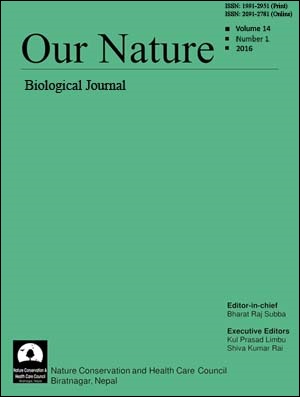Traditional honey harvesting by the Pnar community of South Assam, India
DOI:
https://doi.org/10.3126/on.v14i1.16436Keywords:
Barak Valley, Bee, Ethnic community, Traditional knowledgeAbstract
Honey obtained from the bee hives is a sweet food and has a great medicinal value. Honey collected from nature by the ethnic communities is an important source of nutrition and also contribute to their income generation. Honey collection from the wild is especially done by the indigenous tribe and forest dwellers. The Pnar community living in Barak Valley, South Assam is also engaged in the collection of honey from the forest, especially during the spring season. The process starts with the gathering of information, followed by the preparation for the activity and subsequently extraction of honey from the bee hive. The technique used by the Pnar community is a challenging one as it involves harvesting of honey from lofty trees in forest with traditionally made gears like bamboo basket, smoke torch and a one bamboo ladder. The indigenous ways involves lining the bamboo basket with leaves for the collection of honey, using smoke to frighten the bee and storage of honey in the bamboo pipes. The present study exhibits the rich traditional knowledge that has paved the way for a sustainable livelihood since long and at the same time provides income generation opportunity for the community.

This work is licensed under a Creative Commons Attribution-NonCommercial 4.0 International License.
Downloads
Downloads
Published
How to Cite
Issue
Section
License
This license enables reusers to distribute, remix, adapt, and build upon the material in any medium or format for noncommercial purposes only, and only so long as attribution is given to the creator.




